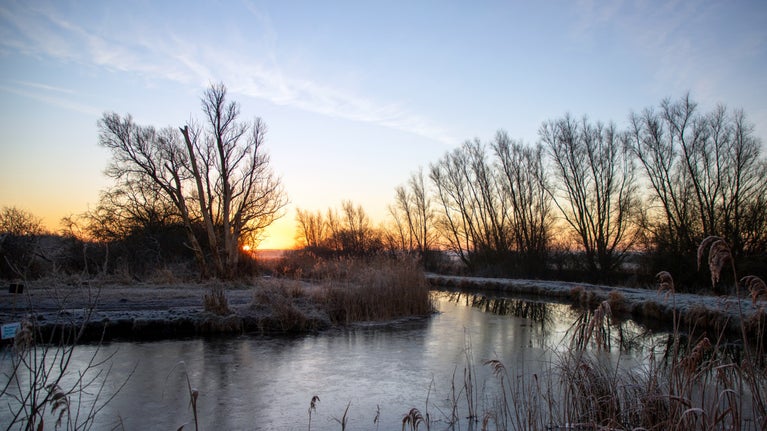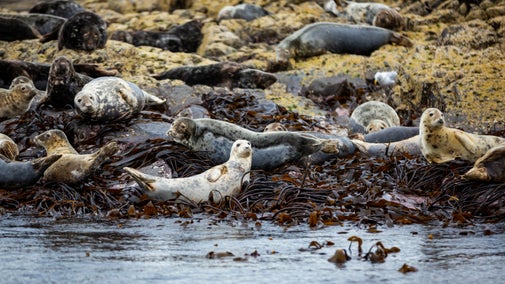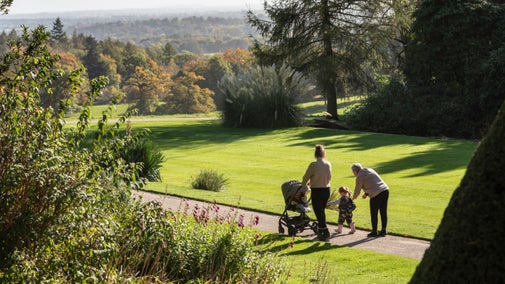
Caring for nature
Learn about our work on nature, climate and sustainability, and find out what you can do to make a difference.

Nature is a source of comfort for many of us, offering space where we can slow down and take stock. Gardens bursting with colour, woodlands shaded by leafy canopies, the simplicity of a rushing stream and panoramic drama in the skies – these can answer our need for quiet and inspiration.
It was our founders' vision to open up natural, quiet spaces for everyone to feel uplifted in their daily lives. More than 125 years later, we're still caring for green spaces so people can take some time to pause, make memories with loved ones in places teeming with life, and ultimately feel calmer through the beautiful outdoors.
We know that if people fall in love with nature, they'll be more likely to look after it. That's why we're encouraging everyone to head outside and spend some time getting to know the beauty of the world all around them.
From the scent of spring blossom to the sea lapping at the shore, autumn leaves crunching under foot and frosty winter mornings, nature is our escape, our place of calm and comfort.
Research we've carried out in partnership with the University of Derby highlights widespread concern about the natural world and a lack of connection to nature.
We believe that nature is for everyone, and that it enriches people’s lives. Nature conservation is one of the National Trust’s key aims, and something we seek to encourage in people.
To find out more, we surveyed over 2,000 adults and over 1,000 children for the Noticing Nature report. The survey explores attitudes to nature, participation in nature activities, participation in pro-nature conservation action (such as providing food for wildlife) and self-reported wellbeing. It looks at relationships between these factors and ‘nature connectedness’, an internationally accepted psychological term that describes how close someone feels to nature.
The report reveals that ‘noticing nature’, or simple everyday interactions with nature, were the most closely linked to conservation action. The most important interactions were:
‘Nature connectedness’ was also a key factor in conservation action. Reading and talking about nature, environmental behaviours, levels of concern, and knowledge of nature also helped explain conservation behaviours.
And to better understand the relationship between wellbeing and ‘noticing nature’ or doing positive things for nature, we undertook a further study. Almost 300 adults were asked to choose one activity from a list of 15, including going barefoot, capturing nature’s beauty and taking a break outdoors, to carry out every day for a week.
Participants reported four key benefits of ‘noticing nature’: being more mindful; an increased sense of togetherness; feeling liberated, and an enhanced sense of self worth.
At the end of the study 92% rated these activities as enjoyable, and more than half said they would do something different as a consequence of taking part.
The report’s findings prompted us to devise an Action Plan, with the broad aims of:

Learn about our work on nature, climate and sustainability, and find out what you can do to make a difference.
Research we've carried out in partnership with the University of Derby highlights widespread concern about the natural world and a lack of connection to nature.
You can help protect and restore the precious habitats and species that are in decline due to the effects of climate change. Donate to the Everyone Needs Nature Appeal today and encourage nature to flourish.

Trees provide vital habitats for a range of wildlife and are one of the best natural defences against climate change. This is why we're aiming to plant and establish 20 million trees by 2030. Donate to Plant a Tree and make a difference.

Discover wildlife, woods and wide open spaces when you visit one of these large parklands. Walk, cycle, play or simply relax in nature.

You can double the fun when you share your wildlife adventures with a friend. Taking a friend on a nature adventure is no. 50 on our list of ‘50 things to do before you’re 11¾’.
